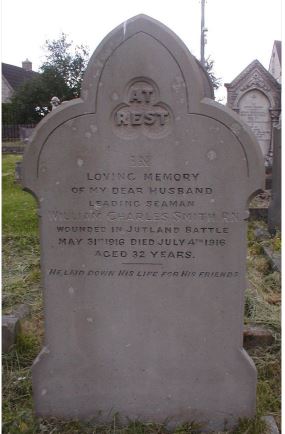Royal Navy – HMS Tiger

William Charles Smith was born on 22 September 1884 at Ruscombe, Gloucestershire. He joined the Royal Navy as a Boy Second Class on 16 January 1901, at the age of 16. He gained the rank of Boy First Class on 17 October of that year and on 22 September 1902, his eighteenth birthday, he enlisted for twelve years’ service and was given the rank of Ordinary Seaman. He became Able Bodied just over one year later on 26 September 1903 and on 23 December 1911 became a Leading Seaman. His Navy record notes that he ‘passed educationally for PO (Petty Officer)’ on 1 March 1910.
He saw service on many warships during his time in the Navy and soon after the outbreak of the Great War he was posted (on 2 October 1914) to the battle cruiser, HMS Tiger. Tiger had been completed in 1913 and was a fast but more lightly armoured version of the dreadnought type of battleship. She was assigned to the 1st Battle Cruiser Squadron and first saw action in the limited naval engagement in the North Sea, known as the Battle of the Dogger Bank.
The Battle Cruiser Fleet, under Admiral Sir David Beatty, were to play a major role in the largest fleet action the world has ever seen, the Battle of Jutland, fought in the North Sea on 31 May and 1 June 1916.
The role of the Battle Cruiser Fleet was to steam ahead of the main fleet of battleships, engage its German counterparts and lure them onto the guns of the main fleet. In mid afternoon of 31 May 1916 Beatty’s ships encountered the vanguard of the German High Seas Fleet steaming north. Firing commenced at about 3.50pm. Tiger was engaged by the German battle cruiser SMS Moltke, who quickly landed six hits, none causing any significant damage. The battle continued on and off until nightfall, when the Germans sought to extricate themselves in the face of superior forces in the form of the British Grand Fleet. In all Tiger sustained eighteen hits, mostly from Moltke but none sufficient to put her out of action. She registered various hits of her own on several German vessels.
Tiger returned to her base at Rosyth on the morning of 2 June and reported 24 of her crew dead and 46 wounded. Leading Seaman William Smith was one of the latter, having sustained severe burns. He was immediately taken off the strength of HMS Tiger (transferring to HMS Vivid, effectively the Royal Navy Personnel Department) and taken to the Royal Infirmary at Edinburgh. He never recovered from his burns and died of pneumonia, aged 32, on 4 July 1916.
His Navy record indicates that at the time of death his was married to Amelia Smith, whose address was shown as Rosendale, Lydd, Kent. It is not known where or when this marriage took place.
His privately erected stone headstone in Whiteshill (St Paul) Churchyard notes that he died of wounds sustained at the Battle of Jutland.
Researched by Graham Adams 1 November 2012
